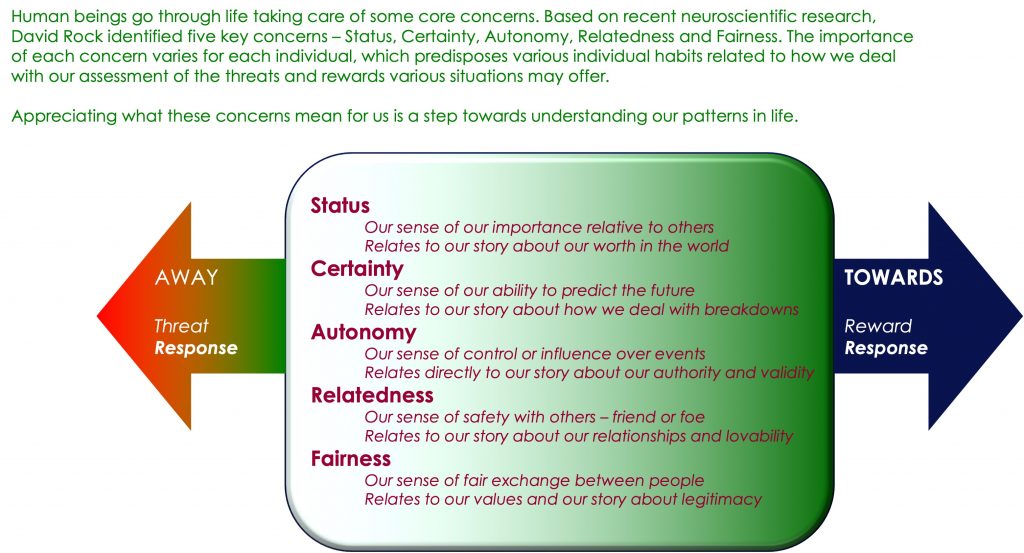
We do not step into the future in a vacuum. Through our life, we develop certain important concerns that we take into the future with us. These concerns form the basis of our interpretations about what is important and the meaning of situations ultimately leading to our actions.
Our interpretations of the world include interpretations of ourselves as human beings and it is commonly assumed that people generally act with intent. If you have ever been cut off in traffic you will know what I mean. Clearly the other driver meant to make my life difficult by cutting lanes in front of me!
An important claim in this approach is human beings, rather than always acting intentionally, mainly act habitually to take care of our concerns. This idea applies to all aspects of our being – physical, emotional, and linguistic.
Although we may have many concerns in life, there are some that seem to be common and central to the human condition. These are our ‘core concerns’.
Above all else, our concern is that we will continue to exist. This makes our physical safety our primary core concern. Some will run from danger, others will fight, but we will generally seek to preserve our existence. If we feel physically safe enough, then other concerns will come to the fore.
I have decided to use the work of David Rock in the field of social neuroscience to define those other core concerns. He claims that human beings can be seen to exhibit overarching organising principles in relation to minimising threat and maximising reward. This is aligned with the Neuro-Linguistic Programming meta-program of ‘moving away’ and ‘moving toward’ and can also be seen as taking a ‘constructive’ or ‘defensive’ stance to the world.
David Rock identified five key domains of concern where human beings seek to minimise threat and maximise reward. He calls this the ‘SCARF’ model; an acronym for five domains – Status, Certainty, Autonomy, Relatedness and Fairness.

Status relates to our importance to others in terms of the value we believe others see in us and how we believe we should be seen. We base those assessments on such things as what we own, how we look and how others treat us.
As we have seen earlier, time is a key aspect of the human condition. We have the capacity to anticipate the future, yet the future is inherently uncertain. As such, we seek to create a sense of greater certainty about our future through various means. How we deal with risk in life is central to this core concern.
Autonomy relates to our capacity to author and influence our future. We want to be able to make decisions for ourselves and see our desires come into being. Authority given to us by others, and by ourselves, is central to this capacity. This often shows up in in connection with a need for certainty or as a strong need to control others.
Relatedness relates to our capacity to create meaningful relationships and to maintain our safety in relation to others. Human beings are social beings and as such we live in communities where we seek acceptance and have a desire to fit in with others. We also need to create intimate relationships to fulfil one of our instinctual needs and procreate.
Fairness relates to our perception of how people, including ourselves, should be treated by others. A sense of fairness is generally based on our sense of ethics and morality.
Clearly, not all these concerns have the same level of importance for everyone and are routinely interpreted differently. Some people place great store in status and less on relationships. Some people see fairness only in the context of themselves and not others. Some people need a high level of certainty, whilst others do not. There is great diversity in our core concerns, yet each of the five play some role in our existence and our sense of self.
As human beings seek meaning to navigate our daily lives, we develop stories of others and ourselves. Our core concerns are central to creating meaning and generating those stories. Our sense of our own dignity, or self-esteem, is the story we create and hold about ourselves in relation to the importance we place on our core concerns. Are we of value to others? Are we capable of dealing with an uncertain future? Do others treat me as a valid human being and give me the authority to play a role in their life? Can I develop meaningful and intimate relationships with others? Do others treat me fairly? To varying degrees, we are always in these questions. Our answers speak to our sense of self and our dignity.
Our issues in life often stem from a need to take care of our dignity and we act in ways to protect or enhance our core concerns. For example, if others treat us in a way that we interpret means they see little value in what we have to offer, we may become withdrawn or aggressive in response to their actions. Such responses generally come with some significant emotional component, which can be a useful way of identifying challenges to our dignity and sense of self.